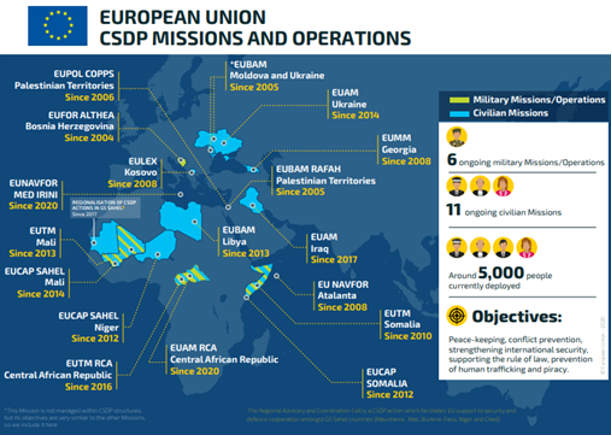News
EU Missions and Operations: EU Common Security and Defence Policy (CSDP)

The EU’s Common Security and Defence Policy (CSDP) provides the European Union with an operational capacity to deploy civilian and military missions and operations abroad. The range of tasks is set out in the EU Treaties, ranging from conflict prevention and peace-keeping, crisis management, joint disarmament operations, and military advice and assistance tasks to humanitarian and rescue and post-conflict stabilisation tasks.
The first EU missions were launched in 2003, including the EU’s policing mission in Bosnia and Herzegovina and a military operation in North Macedonia. Since then, the EU has launched and run 36 operations and missions on three continents. As of today, there are 17 ongoing CSDP missions and operations, of which 11 are civilian and 6 military. EUAM RCA - the latest civilian mission launched in the Central African Republic - has reached Initial Operational Capability in July 2020, with the core team deployed to Bangui.
Since the launch of the first missions and operations back in 2003, the EU has continuously enhanced its structures, mechanisms and tools to promote stability and security in our wider neighbourhood, thereby contributing to increased security in the EU.
A TOOL FOR SECURITY
What happens beyond the EU’s borders has a direct impact on the security of European citizens. CSDP missions and operations are a unique instrument in the EU’s toolbox, contributing to global security abroad and at home. Their aim is to help resolve or prevent conflict and crises, enhance the capacities of partners and, ultimately, protect the European Union and its citizens.
EU decisions to deploy a mission or operation are normally taken at the request of the partner country to which assistance is provided and/or on the basis of a United Nations Security Council Resolution, and always in full respect of international law. These decisions take into account the EU’s security interests, EU strategic efforts and regional engagement strategies. They are tailored to the local circumstances and to the tasks that need to be implemented.
PLANNING AND CONDUCT PROCEDURES
- Decision making: Decisions to establish and to launch missions and operations require the approval of all Member States through a Council Decision. The planning process is governed by crisis management procedures.
- Force Generation: The majority of assets and personnel required for military as well as civilian missions and operations are provided by Member States.
- Command and Control Structures: During the conduct phase, the Political and Security Committee (where all EU Member States are represented) exercises political control and strategic direction of both civilian and military missions and operations, under the authority of the Council and the High Representative. Each mission and operation has a single and identifiable chain of command for its safe and efficient conduct:
- For military operations with an executive mandate (e.g. EUNAVFOR MED IRINI in the Mediterranean), an operational headquarters is usually provided by a Member State acting as a framework nation.
- Alternatively, the EU can also have recourse to NATO command structures under the Berlin-Plus agreements (e.g. EUFOR Althea in BosniaHerzegovina) or activate the EU Operations Centre.
- The military training missions in the Central African Republic, Mali and Somalia operate under one command located within the Military Staff of the EEAS in Brussels – the Military Planning and Conduct Capability (MPCC), which ensures a better coordination and cooperation between military and civilian actors.
- All civilian missions and operations are commanded by the Civilian Planning and Conduct Capability (CPCC) of the EEAS.
FINANCING MECHANISM
Civilian missions are financed through the CFSP budget. The common costs of military operations cannot be funded by the EU budget and are instead covered by Member States through the so-called Athena mechanism – soon to be superseded by the European Peace Facility.
For information on how B2EU Consulting could support your organisation in developing a funding strategy and in unlocking different financing tools for your operation in the security and defence sector, please don’t hesitate to contact us at: info@b2eu-consulting.com







